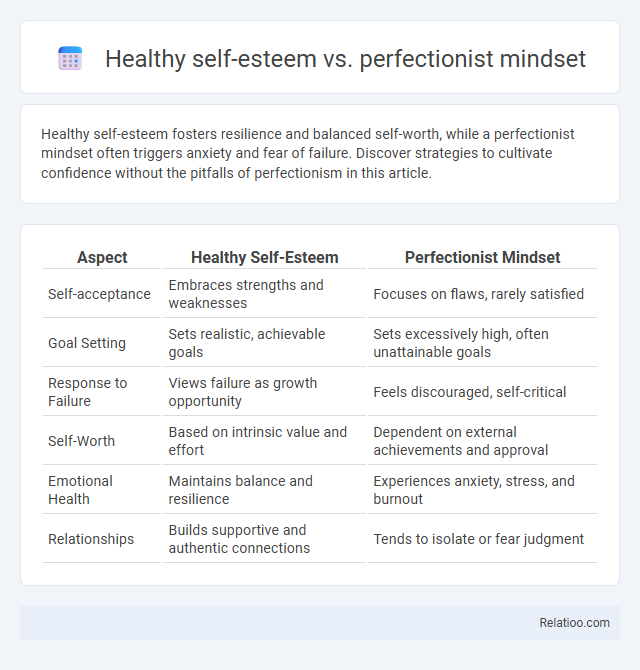Healthy self-esteem fosters resilience and balanced self-worth, while a perfectionist mindset often triggers anxiety and fear of failure. Discover strategies to cultivate confidence without the pitfalls of perfectionism in this article.
Table of Comparison
| Aspect | Healthy Self-Esteem | Perfectionist Mindset |
|---|---|---|
| Self-acceptance | Embraces strengths and weaknesses | Focuses on flaws, rarely satisfied |
| Goal Setting | Sets realistic, achievable goals | Sets excessively high, often unattainable goals |
| Response to Failure | Views failure as growth opportunity | Feels discouraged, self-critical |
| Self-Worth | Based on intrinsic value and effort | Dependent on external achievements and approval |
| Emotional Health | Maintains balance and resilience | Experiences anxiety, stress, and burnout |
| Relationships | Builds supportive and authentic connections | Tends to isolate or fear judgment |
Understanding Healthy Self-Esteem
Healthy self-esteem involves recognizing your worth and accepting imperfections without harsh self-judgment, which promotes resilience and well-being. A perfectionist mindset often leads to unrealistic standards and constant self-criticism, undermining confidence and causing stress. You can cultivate healthy self-esteem by focusing on self-acceptance and valuing effort over unattainable perfection.
What Defines a Perfectionist Mindset?
A perfectionist mindset is defined by an intense drive to achieve flawlessness, often characterized by setting unattainably high standards and harsh self-criticism when those standards are not met. Unlike healthy self-esteem, which values growth and self-acceptance, perfectionism can lead to chronic stress, fear of failure, and reduced motivation due to unrealistic expectations. Your ability to recognize and balance these tendencies is essential for fostering well-being and maintaining productive goals.
Root Causes: Self-Esteem vs. Perfectionism
Healthy self-esteem arises from authentic self-acceptance and a realistic appraisal of your strengths and limitations, fostering resilience and confidence. The root cause of a perfectionist mindset lies in an underlying fear of failure and conditional self-worth, driving compulsive standards and self-criticism. Perfectionism often stems from low self-esteem, where external validation replaces internal acceptance, causing persistent dissatisfaction despite achievements.
Key Differences Between Self-Esteem and Perfectionism
Healthy self-esteem centers on recognizing your intrinsic worth without overly focusing on flaws, promoting resilience and balanced self-view. In contrast, perfectionism drives a relentless pursuit of flawlessness, often leading to self-criticism and anxiety when goals are unmet. The perfectionist mindset magnifies mistakes, whereas healthy self-esteem encourages growth and self-compassion.
The Emotional Impact of Perfectionism
Perfectionism often leads to chronic self-criticism, fostering feelings of inadequacy and anxiety that undermine healthy self-esteem. A perfectionist mindset imposes unrealistic standards, causing emotional distress and increasing vulnerability to depression and stress-related disorders. In contrast, healthy self-esteem embraces imperfection, promoting resilience and emotional well-being despite setbacks or mistakes.
Healthy Self-Esteem: Traits and Benefits
Healthy self-esteem is characterized by realistic self-appraisal, resilience in the face of setbacks, and a balanced sense of self-worth, promoting mental well-being and adaptive coping strategies. In contrast to perfectionist mindset and perfectionism, which often involve unrealistic standards and fear of failure, healthy self-esteem fosters motivation without self-criticism or anxiety. Benefits include improved emotional regulation, enhanced relationships, and increased overall life satisfaction.
Recognizing Perfectionist Traps
Healthy self-esteem fosters resilience and self-acceptance, enabling individuals to recognize personal growth areas without harsh judgment. The perfectionist mindset often blurs this balance by setting unrealistically high standards, leading to chronic dissatisfaction and fear of failure. Recognizing perfectionist traps involves identifying patterns of all-or-nothing thinking, procrastination due to fear of mistakes, and constant self-criticism, which hinder progress and well-being.
Building Resilience and Self-Compassion
Healthy self-esteem fosters resilience by encouraging You to accept imperfections and learn from mistakes, while a perfectionist mindset often leads to excessive self-criticism and fear of failure. Perfectionism can undermine mental well-being by creating unrealistic standards, whereas building self-compassion strengthens emotional resilience and promotes a balanced perspective. Cultivating self-compassion helps shift the focus from unattainable perfection to personal growth and psychological health.
Practical Steps to Shift from Perfectionism to Healthy Self-Esteem
Developing healthy self-esteem involves recognizing personal worth beyond flawless achievements and embracing imperfections as growth opportunities. Practical steps to shift from perfectionism include setting realistic goals, practicing self-compassion, and reframing mistakes as valuable learning experiences. Consistently challenging perfectionist thoughts and celebrating progress fosters a balanced mindset centered on self-acceptance rather than unattainable standards.
Fostering Lifelong Confidence and Growth
Healthy self-esteem cultivates a balanced sense of self-worth by embracing growth and learning from mistakes, unlike a perfectionist mindset that demands flawless performance and often leads to anxiety. Perfectionism hinders lifelong confidence by creating unrealistic expectations, whereas fostering a growth-oriented attitude encourages resilience, self-compassion, and continuous personal development. Emphasizing progress over perfection supports sustainable mental well-being and empowers individuals to pursue goals with adaptability and optimism.

Infographic: Healthy self-esteem vs Perfectionist mindset
 relatioo.com
relatioo.com